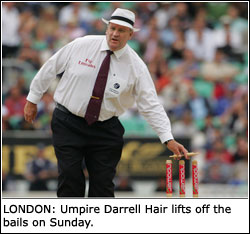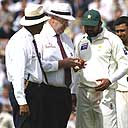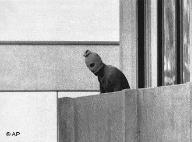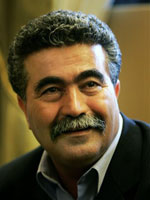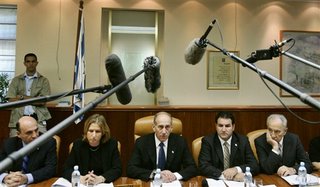Musharraf's Bugti Blunder
The killing of Baloch tribal leader Nawab Akbar Bugti has brought the issue of Balochi nationalism to the forefront of the international media while at the same time cause strife in Pakistan itself. The military attack on the strongman’s mountainous hideout killed not only Bugti but also other members of the tribe and Bugti’s own grandsons. What seemed like a military success operationally has turned the tables on Musharraf and his regime. The nationalist movement of the Baloch people dates backs many decades, in which many unrests, most notably in 1973, has led to widespread bloodshed on both sides of the conflict. While the army had been painting the erstwhile Chief Minister Bugti as a legitimate resistance leader, the fallout from his assassination has made the military issue statements clarifying that Bugti was never on their hit list. Bugti, famed for allegedly having killed his first human being at the age of 12, had adopted a confrontationalist view against Musharraf. He had openly defied orders for the Pakistani military to have access to the tribal heartland and vowed to fight the army tooth and nail. The Pakistan army has carried out numerous strikes in the region as part of its war on terror. The Pakistani’s have artfully used the pretext of Al-Qaeda and Taliban in its territories to fight a twin battle against the Baloch resistance and the Al-Qaeda movement at the same time. Critics argue that Pakistan is hoodwinking the western governments by targeting the Balochs while claiming to be fighting global jihad. Also the use of American weaponry and firepower against Pakistani nationals has sparked outrage in many edit columns and amongst political observers.
India has reacted to the killing of Bugti and has condemned the incident. Much to the chagrin of the Pakistani establishment, we have called Bugti an important national leader and a nationalist. The Pakistani foreign office has accused the Indian side of meddling with the internal affairs of a sovereign state. While Pakistan may reserve the right to be annoyed at India’s reaction, there is no doubt that Pakistan has been guilty of committing the same crime in Kashmir and other terror affected regions. Analysts also point out that India has been tacitly supporting the Baloch resistance. The proof of any such involvement by the Indians or RAW is still conjecture and no concrete evidence has ever been given. While it may just be that India is extending moral support for the Baloch, it is for the strategic interest of India to support the Baloch. However, supporting the Baloch movement has had a deadly repercussion post the war in Afghanistan. The constant fighting and the confluence of the nationalist resistance with the Al-Qaeda jihadis has ensured a safe haven for the Al-Qaeda leadership for their training, planning and most importantly shelter. This double-edged sword has being yo-yoing in and out of India’s favour as it has for the Pakistani government.
The Bugti assassination has undoubtedly caused the maximum harm to Musharraf. Already reeling under pressure from the West to do more to flush its territory clean of Al-Qaeda, there is additional pressure from the political establishment for him to give up his military uniform. The lull in the peace process with India and the links of the foiled airplane bombings and the 7/7 Mumbai blasts to extremists in Pakistan have ensured that Musharraf is not the usual boisterous leader we have become accustomed to see. The political parties are also now regrouping, albeit, in places like the UK and Saudi Arabia, with Benazir Bhutto and Nawaz Sharief forging an alliance to fight the Musharraf backed current Prime Minister Shaukat Aziz. Aziz himself is facing a no confidence motion in the assembly and senate against his leadership. Musharraf, though under pressure to express regret over the assassination of Bugti, has no option but to congratulate his army for fear of a military coup to replace him. This precarious situation means uncertain times for Pakistan, which is increasingly looking like a country on the brink, with too many contradictions pulling themselves in opposite directions and with the leadership increasingly looking under duress and lacking public support. The tensions on the streets of Karachi and Islamabad may die down, but the political ramifications of this latest incident will further menacingly destabilize the country, a sign for India to keep all eyes on its volatile neighbor for the moment.
India has reacted to the killing of Bugti and has condemned the incident. Much to the chagrin of the Pakistani establishment, we have called Bugti an important national leader and a nationalist. The Pakistani foreign office has accused the Indian side of meddling with the internal affairs of a sovereign state. While Pakistan may reserve the right to be annoyed at India’s reaction, there is no doubt that Pakistan has been guilty of committing the same crime in Kashmir and other terror affected regions. Analysts also point out that India has been tacitly supporting the Baloch resistance. The proof of any such involvement by the Indians or RAW is still conjecture and no concrete evidence has ever been given. While it may just be that India is extending moral support for the Baloch, it is for the strategic interest of India to support the Baloch. However, supporting the Baloch movement has had a deadly repercussion post the war in Afghanistan. The constant fighting and the confluence of the nationalist resistance with the Al-Qaeda jihadis has ensured a safe haven for the Al-Qaeda leadership for their training, planning and most importantly shelter. This double-edged sword has being yo-yoing in and out of India’s favour as it has for the Pakistani government.
The Bugti assassination has undoubtedly caused the maximum harm to Musharraf. Already reeling under pressure from the West to do more to flush its territory clean of Al-Qaeda, there is additional pressure from the political establishment for him to give up his military uniform. The lull in the peace process with India and the links of the foiled airplane bombings and the 7/7 Mumbai blasts to extremists in Pakistan have ensured that Musharraf is not the usual boisterous leader we have become accustomed to see. The political parties are also now regrouping, albeit, in places like the UK and Saudi Arabia, with Benazir Bhutto and Nawaz Sharief forging an alliance to fight the Musharraf backed current Prime Minister Shaukat Aziz. Aziz himself is facing a no confidence motion in the assembly and senate against his leadership. Musharraf, though under pressure to express regret over the assassination of Bugti, has no option but to congratulate his army for fear of a military coup to replace him. This precarious situation means uncertain times for Pakistan, which is increasingly looking like a country on the brink, with too many contradictions pulling themselves in opposite directions and with the leadership increasingly looking under duress and lacking public support. The tensions on the streets of Karachi and Islamabad may die down, but the political ramifications of this latest incident will further menacingly destabilize the country, a sign for India to keep all eyes on its volatile neighbor for the moment.
